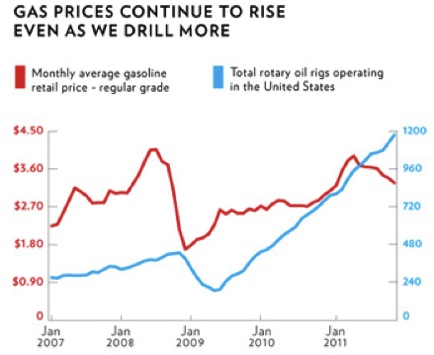
It’s been almost a year since the Obama administration released its Blueprint for a Secure Energy Future, but more importantly, it’s been two weeks since Energy Secretary Steven Chu got chewed out for not caring enough about lowering gas prices. And Newt Gingrich, whose presidential campaign is slipping into irrelevancy, can still do some political damage with his claim that he could bring gas prices down to $2.50.
So, the administration is taking this opportunity to show off what it’s done to reduce the nation’s dependence on oil with its one-year progress report on the blueprint.
Two weeks ago, Chu said something in a Congressional hearing that vaguely hinted that reducing gas prices so Americans could continue to guzzle fuel in SUVs was not actually his top priority. Here’s how it went: Rep. Alan Nunnelee (R-MS) was grilling Chu about what the department was doing to lower gas prices. Nunnelee wasn’t impressed by Chu’s talk of developing “cost-effective” alternatives, like new battery technologies and natural gas – he wanted relief from high prices now.
Nunnelee started to ask, “But is the overall goal to get our price —”, but didn’t finish the sentence before Chu replied, “No, the overall goal is to decrease our dependency on oil, to build and strengthen our economy.”
It’s the “no” that killed Chu. The point he was making is unassailable – that the administration is looking far beyond day-to-day price fluctuations and toward real economic and environmental sustainability. But all conservatives heard was the “no” and went around proclaiming that President Obama’s energy secretary is still trying to "figure out how to boost the price of gasoline to the levels in Europe," as he advocated in an interview with The Wall Street Journal before assuming his current position. (He has since repudiated that idea.)
The revised blueprint comes at the perfect time to bring home what Chu actually meant in his comments to Nunnelee. But it’s not all the rosy picture environmentalists might have wished for.
The first thing the report highlights is the fact that domestic oil production has increased every year Obama has been in office, reaching the highest level since 2003. Then it goes on to boast about the administration’s advances in natural gas, much of which is extracted through an extremely dangerous and dirty process known as fracking. All this means oil imports are down to 45 percent of U.S. consumption, from 57 percent when Obama took office. That’s not so exciting when you realize what it’s being replaced with.
The blueprint update includes a section on transportation, which mainly focuses on clean fuels, long the focal point of the president’s green jobs agenda. Obama tightened fuel economy standards for trucks, supported research into electric-car technology, and invested in biofuels and, again, natural gas as alternatives to oil. All of these innovations, of course, aren't enough to make up for the wastefulness of car dependence.
The report does include a section on livability, which mostly focuses on building efficiency but also discusses TIGER and other administration efforts to improve transit options. President Obama has recommended permanently authorizing TIGER with an allocation of $3.4 billion over the next six years, as well as doubling transit funding over the last reauthorization. The report boasts about the administration’s increased capital construction grants for transit agencies, its State of Good Repair funding, and its investment in zero-emissions buses.
The administration is justifiably proud of its call for the elimination of $4 billion of fossil fuel industry subsidies. But the report exaggerates U.S. leadership on international climate efforts, gives a cringeworthy shout-out to the domestic nuclear industry, and includes an embarrassingly short shout-out to high-speed rail and Amtrak’s skyrocketing ridership.
The section on the future, meanwhile, is notably short on transit and smart growth. It’s mostly about ARPA-E’s research into new, “clean” technologies. It even seeks to emulate “the concentration of brainpower and resources that defined the Manhattan Project.” What if we already have all the technology we need and we just need the will to switch to a healthier, more sociable, more sustainable lifestyle?
Meanwhile, in a companion infographic extravanganza, the White House is emphasizing that its policies don’t actually impact gas prices – contrary to Gingrich’s claim. The price of oil is set on the world market, dictated by world events like the Arab spring and the financial crisis, the White House asserts – and is driven up further by greedy oil companies. And domestic drilling – while a cornerstone of the administration’s “energy security” policy, as shown by the blueprint – “will never meet our energy needs.” Check out the infographic here.





